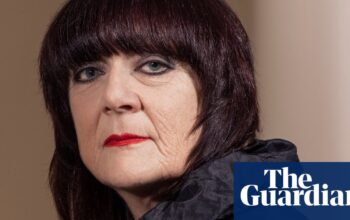T
When Derya Yıldırım first met Axel Oliveres and Antonin Le Gargasson, she was unsure about them. They were two hipsters from France living in east London, while she was a classically trained singer with Turkish parents living in the diverse neighborhood of Veddel in Hamburg. Despite their different backgrounds, they were brought together to perform and reinvent traditional Anatolian folk music for a Hamburg arts festival in 2014.
Yıldırım was not proficient in English or French, while Oliveres and Le Gargasson were not fluent in German or Turkish. She remembers thinking, “Who are these guys?” She explains, “Growing up in Veddel, you’re already used to being discriminated against, and then someone comes to your neighborhood and says they want to create art.” However, almost a decade later, the “outernational” group they formed is still together, even though they have never lived in the same city at the same time. Yıldırım reflects, “As we focused on our instruments, we found a common language.” She compares it to a perfect match on a date.
Yıldırım and South African percussionist Helen Wells are currently located in Berlin, while the two French musicians reside in the French Alps. Despite this geographical distance, their band, known as Derya Yıldırım & Grup Şimşek, has successfully gained a dedicated and enthusiastic following throughout Europe, extending beyond just the Turkish diaspora. Based on their recent performances in Hamburg and Berlin, it is safe to assume that their upcoming show at London’s EartH Hackney this Sunday will attract a diverse and international audience, rather than just members of the local Kurdish community in Kingsland Road.
Yıldırım explains that despite performing traditional songs learned from her parents, who arrived in Western Germany as part of the “guest worker” program in the 1900s, and her own original pieces, they do not appear to have a specific audience. She notes that during their performances, she often notices a lack of Turkish or Kurdish speakers in the audience.
The current music landscape in Germany has been less inclined to include music from migrant communities compared to other parts of Europe. Countries like the UK, France, and Belgium have seen successful fusion acts such as Cornershop, Asian Dub Foundation, Rachid Taha’s rock’n’raï, MC Solaar’s griot-rap, and Stromae’s rumba-infused Europop. However, Germany has not seen the same level of success with orientally influenced “R’n’Besk” from Cologne’s Muhabbet or Portuguese-language indie from Les Robespierre in the Hamburger Schule scene, both of which have remained niche genres.
According to Imran Ayata, a writer and campaigner, Germany lags far behind England and France in terms of bands that successfully blend the music of their migrant parents to create chart-topping hits. In 2013, Ayata curated a popular compilation album called Songs of Gastarbeiter, featuring overlooked musical treasures from the first generation of migrant workers.
Certain tracks, like Ozan Ata Canani’s Deutsche Freunde that Grup Şimşek has performed at live performances, are occasionally played in the more fashionable bars and clubs of Berlin, Hamburg, or Munich. However, they have yet to become popular among the general public. Ayata suggests that this could be due to a lack of nonchalance and coolness, but Derya brings something unique to the table.
Both the Turkish terms “Şimşek” and “Yıldırım” have the same translation of “lightning”. If you attend a live performance by Yıldırım and her band, you will easily see why they chose to emphasize the idea of instant electrification.
Oliveres, Le Gargasson, and Wells deliver a rich fusion of vintage-inspired, jazz-infused psychedelia featuring prominent use of Hammond organs and wah-wah effects. However, when Yıldırım incorporates her bağlama, a lute with seven strings and a long neck, she unleashes bursts of intense energy throughout the venue. At times, during a pause in the rhythm, Yıldırım keeps her hand suspended above her head after strumming one of the instrument’s metal strings, almost as if she is offering herself as a conduit for lightning.

Avoid using the term “windmilling” when referring to it, instead compare the bağlama to a guitar and its strings, which have been played for 30 years. According to Yıldırım, the guitar has developed various genres that are recognized worldwide, such as rock, while the bağlama continues to be associated with its regional origins. However, Yıldırım believes that the bağlama has the ability to evoke universal emotions and is unsure why it has not achieved the same level of recognition.
The bağlama, traditionally played alongside Alevi poets during performances, was introduced to western music through the fusion of Anatolian folk and psychedelic rock by artists like Barış Manço and Erkin Koray. This appealed to a more cosmopolitan younger generation in Turkey. Contemporary bands, such as Altın Gün based in Amsterdam, draw inspiration from these pioneers of the genre, as evident in Grup Şimşek’s debut album Kar Yağar released in 2019.
Looking back, Oliveres admits that their tribute may have been overly obvious: “We were trying to copy too much, we were too easy to predict.” Their album Dost 2, which came out in August of last year, moves away from the complex psychedelic feel of their previous work and takes on a more lighthearted tone, incorporating soulful elements before transitioning into disco with wild keyboards reminiscent of William Onyeabor. In February of this year, Yıldırım and Oliveres released Hey Dostum, Çak!, a diverse mix of children’s songs, lullabies, and retro electronica that is more likely to have your kids bouncing off the walls than drifting off to sleep.
Due to the physical distance between the band members and their limited rehearsals of only four days every couple of months, they may require more time to bring their music to a larger stage. Oliveres believes that this distance can actually be beneficial, as it allows for gradual evolution rather than quick progress.
Although the band draws from various influences, Yıldırım is resolute about her current location. “I understand that people may view our music as retro, but to me it’s more of a fusion between soul and folk,” she explains. “Being from Germany, I don’t want to replicate what was done in Turkey during the 60s and 70s.”
Source: theguardian.com


